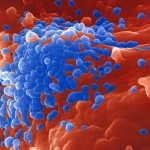Link to Pubmed [PMID] – 21422439
J. Clin. Oncol. 2011 Apr;29(12):1612-9
PURPOSE: A new human polyomavirus, Merkel cell polyomavirus (MCV), was identified in 2008 in tumor tissue of patients with Merkel cell carcinoma (MCC), a relatively rare human skin cancer. In this study, we investigated patients with MCC and controls for the presence of antibodies against MCV and their association with clinical characteristics.
PATIENTS AND METHODS: Antibodies against MCV were investigated by enzyme-linked immunosorbent assay in 68 patients with MCC and 82 controls using VP1 virus-like particles produced in insect cells.
RESULTS: Antibodies against MCV were detected in all patients with MCC and in 85% of controls. However, high antibody titers (> 10,000) were rarely observed in controls (7.3%) and they were detected in 64.7% of patients with MCC (P < .001) in contrast to the absence of VP1 expression in tumor samples. In addition, the geometric mean titer of anti-MCV in patients with MCC was around 14 times higher than that observed in MCV-positive controls (P < .001) and was not correlated with tumor viral load. High antibody titers were not found to be associated with any subject or tumor characteristics, but better progression-free survival was observed in patients with high antibody titers (hazard ratio, 4.6; 95% CI, 1.7 to 12.2; P = .002).
CONCLUSION: High titers of MCV antibodies in a much higher proportion of patients with MCC than in controls confirmed the association between MCV infection and MCC. The findings also indicated that a better progression-free survival occurred in patients with high MCV antibody titers and suggested that there are at least two distinct etiologic causes of MCC.

